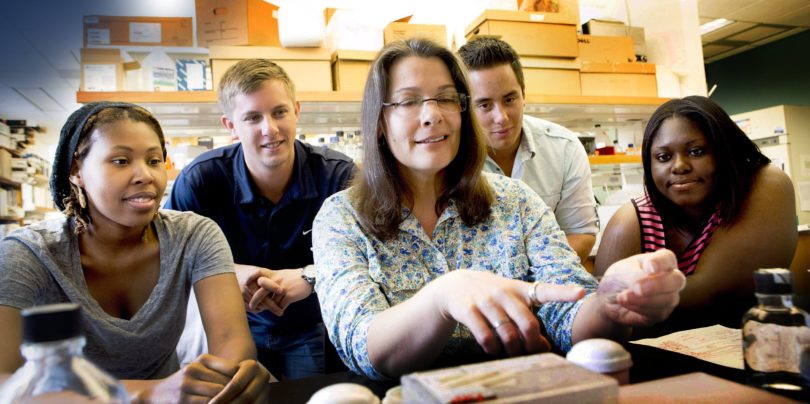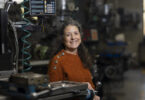Julie Moore, a professor in the College of Veterinary Medicine, has traveled the world to study the impact of malaria on pregnant women and their babies and uses her experiences to add color and context to the concepts she discusses in the classroom.
Where did you earn degrees and what are your current responsibilities at UGA?
I earned my B.S. from St. Lawrence University in New York, my Ph.D. from the University of Connecticut Health Center and performed postdoctoral work at the Centers for Disease Control and Prevention. Currently, I am a professor in the department of infectious diseases in the College of Veterinary Medicine and am a member of the Center for Tropical and Emerging Global Diseases. I serve as assistant department head for curriculum in my department and handle curriculum-related issues for our courses at the undergraduate, graduate and professional levels. I am the point of contact for the Pathogens and Immunity Interdisciplinary Group in the Integrated Life Sciences Graduate Program. I am also director of a new National Institutes of Health-funded post-baccalaureate research education program. I conduct research that investigates the disease processes that contribute to significant loss of life due to malaria infection, with a focus on pregnant women and their babies.
When did you come to UGA and what brought you here?
I came to UGA in 1999. At that time, I was completing my postdoctoral work at the CDC. I had been working in Kenya on malaria infection in the placenta and how it impacts fetal and infant outcomes and was looking for an academic environment that would embrace this line of inquiry. The then-new Center for Tropical and Emerging Global Diseases at UGA represented an excellent environment for this. I was one of the first new faculty members hired into the center.
What are your favorite courses and why?
My favorite course is IDIS/CBIO 3100 (Honors), “People, Parasites and Plagues.” I love to teach this course because it gives science majors an opportunity to learn about infectious diseases viewed through the lens of history, sociology, ecology, public health, politics and economics. It also gives students from those disciplines the chance to learn about the pervasive relevance of human and animal diseases. I come from a liberal arts background and believe that making connections between seemingly disparate concepts is a critical aspect of intellectual growth for undergraduates.
What interests you about your field?
I find infectious diseases in general and malaria, my research focus, fascinating because they epitomize the amazing complexity and adaptability of biological systems. Also, traveling to different regions of the world is an inherent aspect of studying a disease that impacts primarily the developing world. I cherish the opportunities that I’ve had to be immersed in cultures so different from my own. Moreover, I believe that firsthand experiences are necessary to develop a bona fide appreciation of the impact of a devastating disease like malaria, which, in turn, is essential to identifying relevant, workable solutions.
What are some highlights of your career at UGA?
I’ve won several research and teaching awards while at UGA, and my research has been continuously funded by the NIH for the past 13 years. Most recently, I led an effort to secure NIH funding for a post-baccalaureate research education program. PREP@UGA: Post-Baccalaureate Training in Infectious Diseases Research aims to provide individualized research skills and career development training to recent science graduates, with a particular focus on students with disabilities and students from under-represented racial and ethnic groups. The primary goal of PREP@UGA is to prepare these young scientists for successful careers in biomedical research, beginning with entrance into top Ph.D. and M.D./Ph.D. programs in the U.S. Our first group of five scholars began the yearlong program on Aug. 1.
How does your research or scholarship inspire your teaching, and vice versa?
My experiences working in developing countries (as an undergraduate in St. Lawrence University’s Kenya Semester Program, as a Peace Corps volunteer in Morocco, as a Ph.D. scientist in Kenya, and with visits to India, Cameroon, Peru and Colombia) allow me to use illustrative personal vignettes to add color and context to the concepts I discuss in the classroom. Standing helplessly by while an infant with severe malaria gasps his final breath is a powerful image that is nearly as compelling for those who hear the story second-hand as it is for the witness. By sharing my experiences and how they have shaped my career, I strive to inspire students to pursue careers in global health. I also welcome undergraduates into my laboratory for research experiences. This practice is mutually beneficial. While it enriches their undergraduate experience, the students’ enthusiasm and fresh perspective inspire me to contemplate our research questions from new angles and with renewed vigor.
What do you hope students gain from their classroom experience with you?
Most of all, I hope that my students view infectious diseases and their impacts from a new and broader perspective. I also hope that they gain a more global outlook and appreciate the different challenges for health and prosperity that others face.
Describe your ideal student.
My ideal student is one who is conscious of and embraces the process of learning and views education as a lifelong, enriching endeavor, rather than as simply a means to an end. The ideal student attends and prepares for class regularly, participates actively in discussions, disseminates knowledge gained by sharing class materials with friends and family, and brings new insights and information to class to share with fellow students and me.
Favorite place to be/thing to do on campus is …
… attending Performing Arts Center events with my daughter.
Beyond the UGA campus, I like to …
… travel, cook, garden and do projects around the house. The latest is building a coop for my bantam chickens.
Community/civic involvement includes …
… inviting youngsters (from my daughter’s kindergarten class up to high schoolers) to my lab at UGA for an introduction to the fascinating world of science.
Favorite book/movie (and why)?
My favorite book is “Cutting for Stone” by Abraham Verghese. I love reading fiction for pleasure; this book touches on so many things that move and inspire me: life in the developing world; the challenges of being healthy in such environments; medicine and, in particular, obstetrics (my research focuses on malaria in pregnant women); the inexorable bonds that tie family together; the power of forgiveness; and the strength of the human spirit.
Proudest moment at UGA?
My proudest moments at UGA are when I see my graduate and undergraduate students receive the degrees they’ve worked so hard to achieve. It is difficult to describe the feeling of pride and satisfaction that comes with the knowledge that I played a part in that process.
Originally published on Oct. 19, 2014








